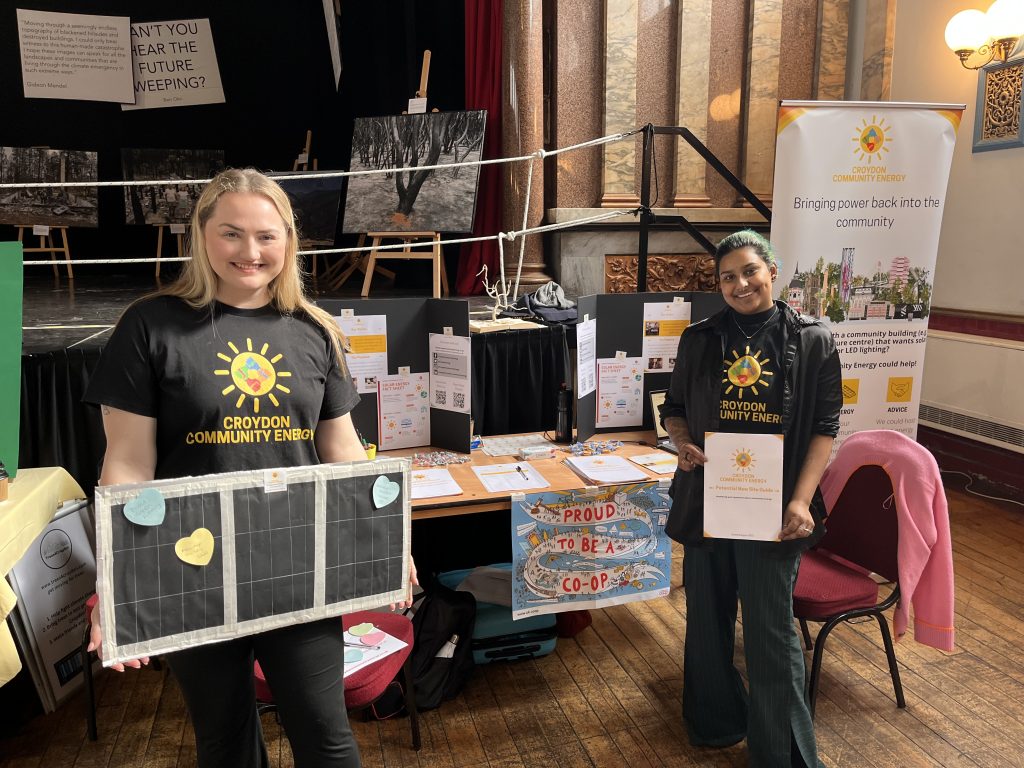Starting a community energy group in your area
19 Jun 2024

Written by Connie Duxbury, founder and CEO of Croydon Community Energy (CCE).
As we are rapidly moving towards a future powered by renewable energy, it’s crucial to bring our communities along the journey. Community energy is a fantastic way to empower our citizens to own renewable energy assets locally and have a say in where the profits are spent. With over 500 community energy groups in the UK, and countries like Denmark leading the way in community ownership, now is the perfect time to start a community energy organisation in your area.
| If you’re looking for support for your community business, check out our new programme Trading for Good Community Business. |
What is community energy?
Simply put, it’s when a community (a street, a town, a city, a parish or even a few people!) come together and raise the money to install solar panels, a wind turbine or a hydro plant within the local area. If installed directly onto a community site, such as a school or church, the building users benefit from electricity far cheaper than from a mainstream energy supplier.
The money is raised typically through a community share offer, meaning local people invest their money into the project, own a piece of the project and usually see a return on their investment over time. As the project generates profits, everyone who invested gets a vote in where they are spent – this could be running an energy advice service to help those in fuel poverty, training for young people, creating a community benefit fund or whatever suits the needs of the area best!
Setting up your own community energy group
Getting involved with community energy is hugely rewarding – not only does it increase the amount of renewable energy in the area, but it also saves money for sites, educates people around where energy comes from and creates resilience within communities. It can be hard work to get the projects off the ground, and it’s not a good idea to try and do it alone as a wide range of skills are needed.
Stage 1: Research
It’s vital to understand what, if anything, is already in your area.
- Is there a neighbouring community energy group willing to give you support? In my experience, the sector as a whole is all about co-operation and I couldn’t have grown CCE without the help of other community energy groups!
- What kind of area do you live in? An urban city is mostly going to work with rooftop solar, and a rural village could be perfect for hydro, wind or even a solar farm!
- Do you know anyone who would want to get involved? Reach out to your networks and ask – remember you don’t need renewable energy experience, key skills needed include community outreach, marketing, business planning, public speaking and more!

Stage 2: Formalise your group
Once you have assembled your team, the below are good ideas to become a formal entity.
- Choose your group name, values, mission and the types of projects you want to do – a good vision and mission statement should be at the heart of what you do.
- Choose who will be on the Board – getting the right people who share the same vision is crucial and will help avoid conflict further down the line.
- Decide on a legal structure – most groups are Community Benefit Societies, but it’s for your Board to decide. There’s helpful guidance here.
- Open a bank account – it’s best to do this as early as you can so you can start applying for funding.
- Set up an online presence – you might be rolling your eyes but in these modern times, having social media and a decent website is a really important step to growing your network and looking professional. Try to find someone who’s good at social media for your group, perhaps even local students!
Stage 3: Funding and Further Support
This stage is where SSE really got CCE off the ground! I applied and was accepted onto their Royal London Changemakers programme under the theme ‘moving fairly to a sustainable world’. Having an unrestricted grant of £20,000 allowed me to cover core costs, host community events, create our branding, host our website, pay myself and more.
- Find funding for core costs – there are lots of grants out there e.g. National Lottery and of course SSE! The sector is 80% volunteer-led so finding early funding will really help.
- Funding for feasibility work for your projects – there are a number of specific options for funding to cover feasibility work e.g. the Government’s Community Energy Fund.
- Seek expert mentoring – whether officially through a programme or other groups, it was brilliant for us to have access to business consultants who gave advice on everything from cashflow modelling to writing a business plan.
- Find your people – join national membership bodies such as Community Energy England and Co-operatives UK, but you might also be in a fantastic cohort of like-minded social entrepreneurs like I was on the programme!
Once you have your group, your people and a bit of cash – the world of community energy is your oyster. The sector is set to grow rapidly over the next few years as the technology gets cheaper and more people are wanting to find alternative sources of power in their communities. Good luck!
Connie Duxbury is an SSE fellow of the ‘Royal London Changemakers’ programme, which gave her access to expert business support, funding and connections with other social enterprise founders.
Interested in growing your community business?
Our brand new programme Trading for Good Community Business is recruiting now!
- Specialised learning and development programme
- Match Trading™ grant
- Ready-made network of support
